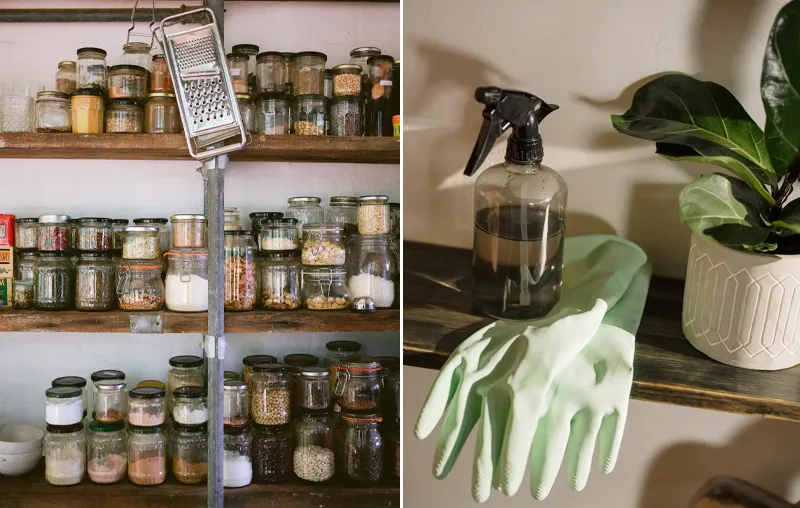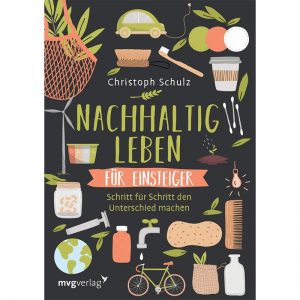Are you looking for the best ways to make your household more sustainable? Then you've come to the right place! We have countless household areas in which really effective and sustainable measures can be implemented with little effort.
Effective and sustainable because, among other things, it protects the environment and climate, reduces your personal CO2 footprint and the amount of waste you generate, reduces Biodiversity and improve quality of life, while also saving money.
In this article, you'll find my best tips for mastering your household sustainably. Simply integrate them into your everyday life bit by bit. Let's go!
50 tips: How can I make my household more sustainable?
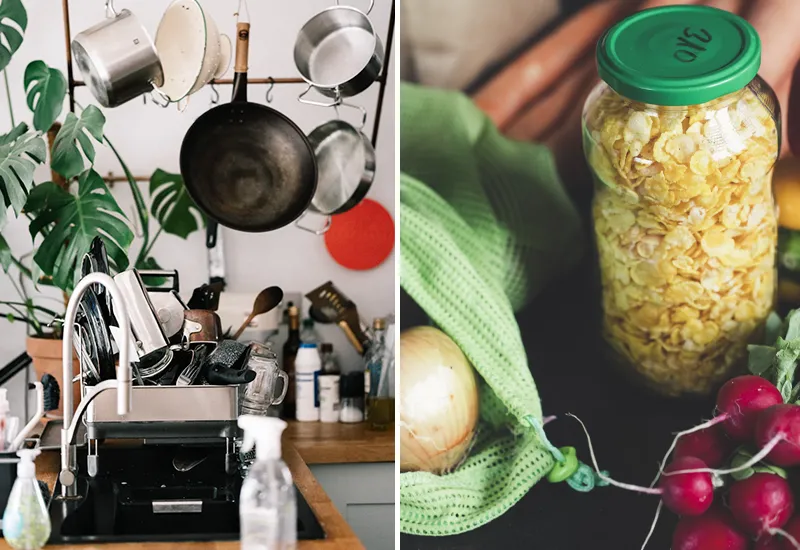
The motives are therefore obvious, are Very diverse and not only help to protect our planet and conserve natural resourcesbut also promote health and well-being.
Here you will find the promised sustainable household tips and ideas that really pay off. Easy to integrate into everyday life let
For info: For a better overview, I have divided them into 10 big tips with 5 practical additional tips each.
1. Buy food consciously
In a sustainable budget, the focus should be on regional, seasonal, plant-based, organic and Products with as little packaging as possible be laid. You can use a rucksack for transportation, for example, or a cargo bike for larger purchases.
It's best to make a shopping plan once a week and think carefully about what you really need before you go to the supermarket. This will help you avoid impulse buying and the unpleasant situation of throwing away leftover food.
Here are 5 practical household tips for shoppingthat you can implement immediately:
- Reduce your consumption of animal foods. (see why vegan?)
- Shop in organic and unpackaged stores if you have the opportunity.
- Grow your own fruit and vegetables on the balcony or in the garden.
- Give preference to foods that are in season. (see seasonal shopping)
- Look out for seals of quality such as organic and Fairtrade.
2. Avoid plastic waste
Plastic waste is another starting point for making your household more sustainable. In addition to the many types of food packaging, it is also generated at home by Disposable products (e.g. straws, aluminum and cling film or to-go cups), which are something like the symbol of our Disposable society are.
Therefore, switch to reusable alternatives - and instead of the things mentioned, I prefer, for example, simple Stainless steel drinking straws, washable Oilclothsand a reusable mug for your coffee.
Here are 5 practical household tips for avoiding plastic wastewhich you can also implement directly:
- Use reusable containers for shopping and storage.
- Give preference to unpackaged food and transport it in Fruit and vegetable nets.
- Replace freezer bags with cloth bags, preserving jars or paper bags.
- Drink tap water instead of mineral water from plastic bottles.
- Switch to solid soaps and shampoos in one piece. (see Hair soaps comparison)
3. Save energy
When it comes to a more sustainable household and a more conscious lifestyle, in addition to the use of renewable energies, the Energy efficiency is particularly important. For this reason, you should use your existing Household appliances and, if appropriate, invest in new, energy-saving appliances.
The purchase of an energy-efficient Refrigerator or an energy-saving Washing machine pays off in the long term, as you can Significantly reduce energy consumption. Speaking of washing machines: air dry your laundry instead of using a tumble dryer. This will also make your household more environmentally friendly.
Also use these additional 5 tips for saving energy in the home:
- Ventilate briefly instead of leaving the window tilted for a long time. (Avoid heat loss)
- Put the lid on the pan when you are boiling pasta water, for example.
- Switch off electrical appliances completely, as they consume electricity in standby mode.
- Place the refrigerator in a shady spot.
- Use motion detectors and reduce outdoor lighting. (see Light pollution)
4. Save water
For more sustainability in the household, you should also Use water more sparingly. It helps, for example, that you repair dripping taps immediately and Water-saving fittings in the bathroom. Even small measures can make a real difference to the environment.
Here are 5 useful tips to help you use less water directly in the household:
- Turn off the tap when brushing your teeth and soaping up.
- Collect rainwater from the roof for watering your garden.
- Only switch on the washing machine and dishwasher when the appliance is full.
- Prefer the shower to the bath. (as short as possible and Take a cool shower)
- Wash your laundry in Eco mode. (see Washing laundry sustainably)
5. Use the Zero Waste Rules
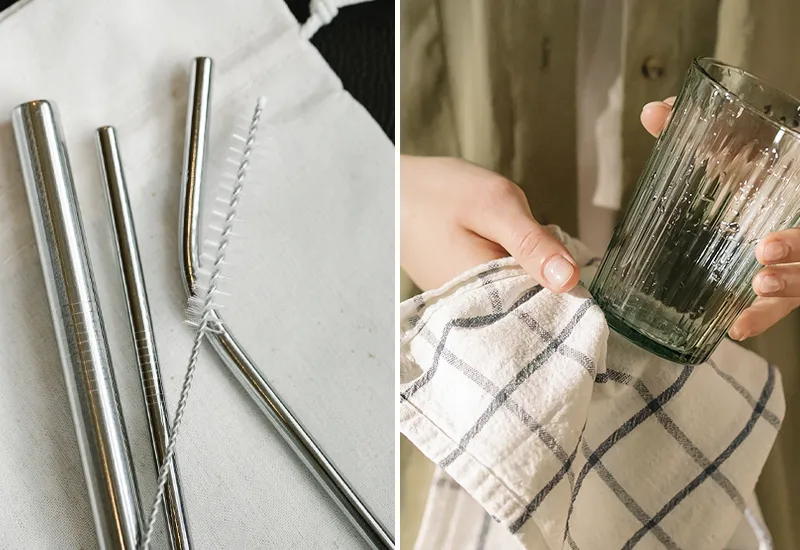
Reduce, reuse, borrow, repair - the waste-avoiding Zero Waste Lifestyle and its rules naturally play a major role in a sustainable household. It's not just about reducing plastic waste, but also, as far as possible avoid any waste.
For example, an important goal is to improve the personal Reduce food waste. One way to do this is to use the Don't take the best-before date too seriously and rely on your senses instead.
Here are 5 more Zero Waste Tipsthat you can take to heart in the household:
- Put the "No advertising!" sticker on the mailbox.
- Save food with food sharing or apps like ToGoodToGo.
- Share, give away or trade things you don't need.
- Replace plastic or paper straws with stainless steel or glass straws.
- Prefer crooked fruit and vegetables and lonely bananas in the supermarket.
6. Save paper
Whether in the kitchen, in the office or through online orders - A lot of paper waste is also generated in the household. The potential for Paper Saving is therefore huge - and fortunately it is also easy to use.
For example, you can eliminate paper waste from classic kitchen paper by washable cloths use. You can save printer paper by double-sided printing and you can keep the shipping cartons and filling material from deliveries and use again for your own shipping.
Here are 5 other useful household tips to reduce your paper wastewhich can also be implemented quickly:
- Give preference to recycled paper when buying printer paper.
- Take your notes in notebooks that can be used for a long time or in digital apps.
- Unsubscribe from unsolicited mail. (see Unsubscribe from advertising by mail)
- Change the way your bank sends account statements to e-mail.
- Subscribe to newspapers digitally instead of in paper form.
7. Use household remedies and make your own cleaning products
Most cleaning products from the drugstore are a real Cocktail of aggressive chemicals - and ultimately questionable not only from an ecological but also from a health point of view.
Luckily, it's pretty easy to make countless cleaning products for your household yourself, and it's also easy to save a lot of money in the long term. All you need are versatile household remedies such as Baking soda, citric acid, soda, curd soap and vinegar.
Here you will find 5 practical application examples (there is so much more!) in the household:
- Use Baking soda* as an odor remover in the trash can or in shoes.
- Remove with Curd soap* stubborn stains from your clothes.
- Use Citric acid* as a descaling agent or pot cleaner.
- Join in Washing soda* unblocked drains.
- Free with Vinegar essence* Furniture and windows from fly dirt.
8. Live minimalistically and consume consciously
A sustainable household lives from a reassuring overview - and that only buy and own the things you really need.
Care for a minimalist lifestylemuck out your Cellar, by Attic, by Closet, your Drawers and Shelves and give away or sell items you no longer need. Then introduce the rule of getting rid of one old item for every new one you buy (quality before quantity!).
Conscious consumer behavior also includes having the mindset to make a Avoid new purchases wherever possible. One way you can do this is by repairing old things or Buying used goods.
Here, too, I still have 5 practical, minimalist household tips for you:
- Borrow a van, drill, etc. to accumulate fewer possessions.
- Equip your closet with timeless, easy-to-combine pieces. (see Capsule Wardrobe)
- Wait 24 hours before you buy something. (Avoid impulse buying)
- Follow the "Buy Me Once" principle and prefer products that will last a lifetime.
- Try to live without a car if you have the opportunity. (see car free living)
Tip: If you want to learn more about the long list of Advantages of second-hand purchases If you want to find out more, be sure to take a look at the linked blog article.
9. Separate waste correctly and compost organic waste
Of course, waste cannot be completely avoided. Nevertheless, with a consistent, proper waste separation make your household even more sustainable by facilitating the recycling of recyclable materials and conserving natural resources.
You can even turn your organic waste into a compost heap at home in no time at all. fertile garden soil and do something for biodiversity.
Here are 5 tips for separating household wastethat you can implement in the future:
- Take old rechargeable batteries and other items to the recycling center. (see Dispose of electrical waste)
- Find out about the correct waste separation in your municipality.
- Prefer drinks in returnable bottles and return them to the deposit system.
- Set up a clear separation system for the different types of waste.
- Dispose of glass bottles in the appropriate glass containers. (white, green and brown)
10. Re- and upcycle things
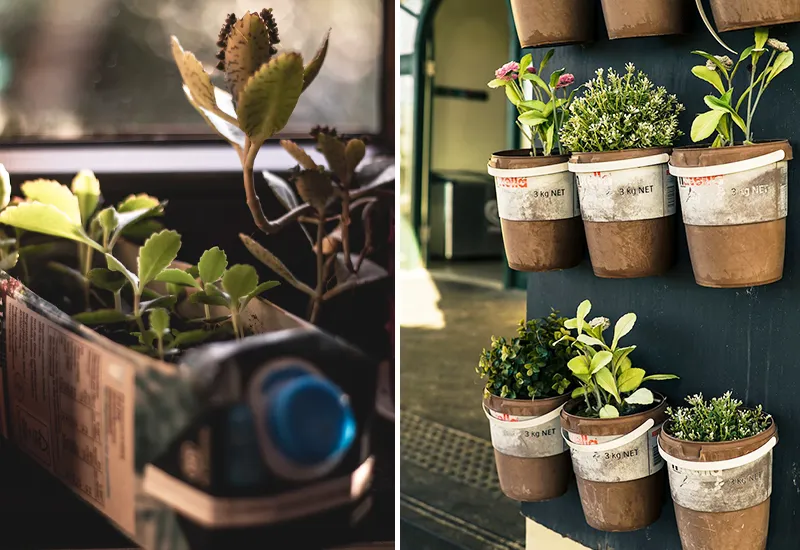
Not all discarded items have to go in the garbage can! With a dash of creativity you also ensure more sustainability in the household by recycle old things or simply repurpose them.
So you can decorative plant pots made from empty paint buckets and Tetra-Paks, for example tinker. Your wealth of ideas are Upcycling there are no limits.
You can also use the following 5 upcycling tips as a source of inspiration:
- Turn old T-shirts into cleaning rags or shopping bags.
- Use newspaper as a liner in the garbage can. (see Garbage bag made from newspaper)
- Convert tin cans into storage containers or flower pots.
- Turn Euro pallets into a bed or a comfortable sofa.
- Make a storage box from a disused book.
Big effect with little effort - how to make your household more sustainable
From shopping, avoiding waste, saving energy and water, to the creative repurposing of discarded items - you see, there really is a lot to do. a whole cornucopia of possibilities for more sustainability in the household. You just have to use them.
"What we do today will determine what the world looks like tomorrow."
Marie von Ebner-Eschenbach (more at Environmental protection quotes)
The 50 tips in this article should help you to achieve this. Keep in mind, however, that even a sustainable and environmentally friendly household is not created overnight, but as a process, which requires some patience. Then the (constant) implementation is automatically even more fun.
Do you have any questions, suggestions or other tips from your own experience that you would like to share? Then I look forward to hearing from you in the comments.
Stay sustainable,

PS: There are a few things that help me personally to avoid waste. In the linked article, I would now like to introduce you to my Zero Waste Basic Equipment before.

